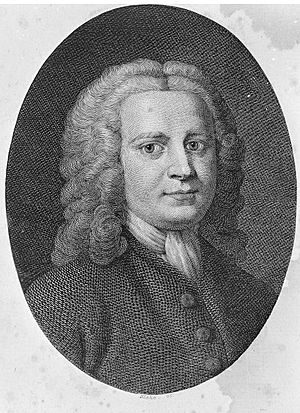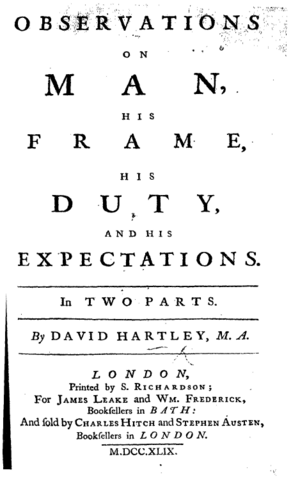David Hartley (philosopher) facts for kids
Quick facts for kids
David Hartley
|
|
|---|---|

Engraving by William Blake in the 1791 edition of Hartley's Observations on Man
|
|
| Born | Baptized 21 June 1705 Halifax, England
|
| Died | 28 August 1757 (aged 52) Bath, England
|
| Alma mater | Jesus College, Cambridge |
| Era | 18th-century philosophy |
| Region | Western philosophy |
| School |
|
|
Main interests
|
|
|
Notable ideas
|
|
|
Influences
|
|
| Signature | |
David Hartley (baptized 21 June 1705; died 28 August 1757) was an English philosopher. He is known for starting the Associationist school of psychology. This way of thinking explains how our ideas and thoughts connect in our minds.
Contents
Early Life and Family
David Hartley was born in 1705 near Halifax, England. His mother died when he was very young, and his father, a church leader, passed away when David was fifteen.
He went to Bradford Grammar School and then to Jesus College, Cambridge in 1722. He earned his first degree in 1726 and a master's degree in 1729.
In 1730, Hartley became the first non-clergyman to be the Master of Magnus Grammar School. It was there that he began working as a doctor. He married Alice Rowley in 1730, and they moved to Bury St Edmunds. Alice died soon after giving birth to their son, David Hartley (the Younger), in 1731.
Later, Hartley married Elizabeth Packer in 1735. Her family was very wealthy. David and Elizabeth had a daughter, Mary, and a son, Winchcombe Henry Hartley. In 1742, the family moved to Bath, where David Hartley died in 1757. He was buried in Old Sodbury, Gloucestershire.
Education and Career as a Doctor
At Cambridge, Hartley studied with Nicholas Saunderson, a brilliant math professor who was blind. Hartley helped publish Saunderson's math book after he died.
Hartley decided not to become a church leader because he didn't agree with all the rules of the Church of England. For example, he believed that everyone would eventually find happiness and that eternal punishment was not fair. He thought that "Universal Happiness is the Fundamental Doctrine both of Reason & Scripture."
He also believed that helping others was the best way to find happiness. This idea guided his life. He supported projects like publishing Saunderson's book and promoting a shorthand system that he thought could help people communicate better.
Fighting Smallpox
As a doctor, Hartley became a strong supporter of variolation for smallpox. This was an early way to protect people from smallpox by giving them a mild form of the disease. It was risky, but it could prevent a much worse illness. Hartley wrote a paper in 1733, explaining why this practice was good for both individuals and the community.
He became well-known among other doctors and important people, including members of the Royal Society. He also became a doctor for the Duke of Newcastle.
Helping with Kidney Stones
Hartley himself suffered from a painful condition called "the stone" (bladder stones). He believed a herbalist named Joanna Stephens had a medicine that could dissolve these stones. He published a book in 1738 sharing cases of people who took her medicine, including his own painful experience.
To make this medicine available to everyone, Hartley convinced the government to pay Stephens for her secret recipe. He then worked with another scientist, Stephen Hales, to figure out how the medicine worked. They found that it contained slaked lime and a type of soap. They realized these ingredients made a person's urine alkaline, which helped dissolve the stones. Their findings were published in a Latin book in 1740.
In Bath, Hartley continued his medical practice and worked on his most important book, Observations on Man. He was also a vegetarian.
Observations on Man: A New Way to Understand People
In the 1700s, "Observations" in a book title meant it was a scientific work. Hartley's friend, Joseph Priestley, said Hartley's book was "a new and most extensive science." This new science was about understanding "man," meaning people.
The book is full of many different observations. As a doctor, Hartley wrote about things like phantom limbs (when someone feels a limb that isn't there), savant syndrome (when someone has amazing mental abilities), and how blind and deaf people experience the world.
Hartley believed there was one main "law" that explained everything about people: "association." He thought that all his observations showed how this law worked.
For example, he explained how a child who is bullied might grow up to be a bully themselves. He showed how a child's defensive actions can change over time into aggressive actions as an adult.
However, Hartley was very hopeful. He believed that through association, people could change for the better and become happier. He saw his book as a story of how each person can improve their life.
Hartley's Main Ideas
Like John Locke, Hartley believed that when we are born, our minds are like a blank slate. This means we don't have any ideas yet. All our thoughts and feelings come from our experiences and sensations. Hartley focused on one main rule for how our minds grow: the law of contiguity. This means that ideas that happen together, either at the same time or one after another, become linked in our minds.
The Idea of Vibrations
Hartley thought that when we feel something, tiny parts of our nerves and brain vibrate. He imagined a special, invisible "ether" that helped these vibrations happen. He believed that pleasant feelings came from gentle vibrations, and pain came from very strong ones that hurt the nerves.
These vibrations leave faint traces in the brain, which he called "vibratiuncles." These faint vibrations are how we remember things.
The Idea of Associations
Hartley explained that our brains are always vibrating a little because of body heat and blood flow. The type of vibrations depends on our past experiences. When sensations often happen together, they become linked. For example, if you always hear a certain song when you eat a specific food, eventually just hearing the song might make you think of the food. Sometimes, these linked ideas become so strong that they seem like one new idea.
Free Will
Hartley also thought about whether people have free will. He believed that our actions are a result of strong connections between our thoughts and our movements. Because of this, he thought that our choices are determined by our past experiences and the current situation. He came to this conclusion after a lot of thought, as it fit with his theories about how the mind works.
Major Books by David Hartley
- Conjecturae quaedam de sensu, motu, et idearum generatione (1746) – This was a Latin work about how we sense, move, and form ideas.
- Observations on Man, His Frame, His Duty, and His Expectations (1749) – His most famous work, explaining his ideas about human nature and the mind.
- Prayers and Religious Meditations (1810) – A collection of his prayers and thoughts on religion.
David Hartley also wrote many books and papers about medicine.
See also
 In Spanish: David Hartley para niños
In Spanish: David Hartley para niños
 | Jackie Robinson |
 | Jack Johnson |
 | Althea Gibson |
 | Arthur Ashe |
 | Muhammad Ali |


